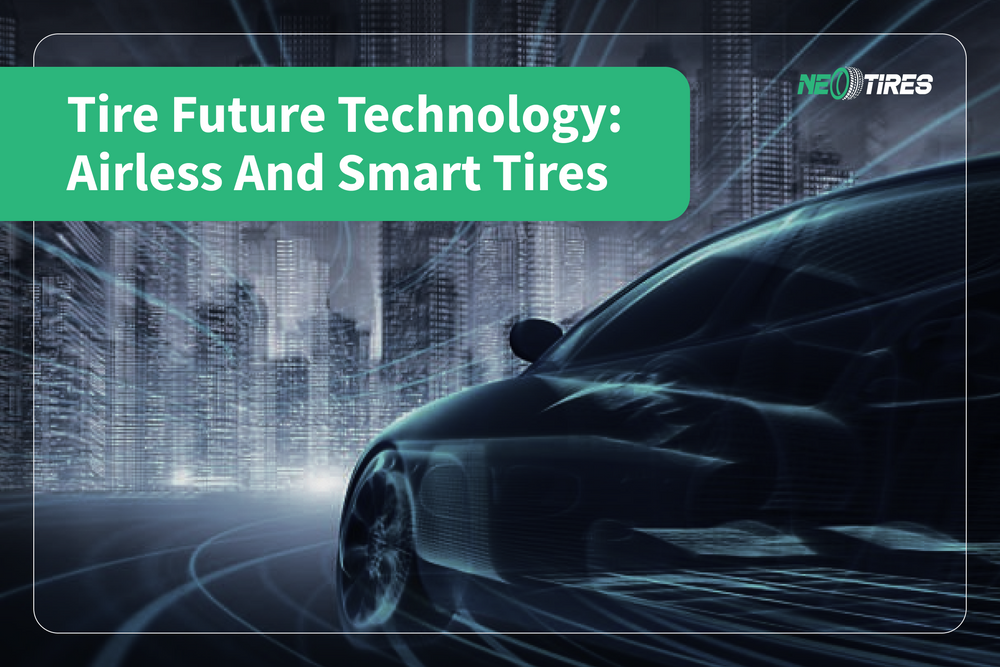Airless and smart tires have become key topics in modern vehicle innovation. As vehicle electrification, automation, and materials science progress, traditional pneumatic tires slowly lose attention.
The move toward non-pneumatic, sensor-equipped, and smart tire systems is seen as the next big step in transportation. The tire industry’s shift toward digital technology and engineering is a natural response to the fast changes in vehicle systems.
While airless tires may seem new, the first efforts to create them go back several decades. Today, many global manufacturers are still working to improve these systems for commercial use. This article looks at what airless tires are, the technology behind smart tires, their advantages and drawbacks, and when these innovations might appear in mass-market vehicles.
Table of Contents
What Are Airless Tires? (Non-Pneumatic Tire Technology Explained)
Airless tires, also known as non-pneumatic tires (NPT), are tires that contain no air and function independently of internal pressure. The specific construction of airless tires eliminates the risk of flats or blowouts and reduces maintenance requirements.
Today, airless tires are commonly used in applications such as:
- Utility and construction equipment
- Lawn and garden machinery
- Golf carts
- Slow-moving off-road vehicles
For passenger vehicles, development is ongoing as manufacturers refine stability, handling, and heat-resistance characteristics.
How Airless Tires Are Built
The structure varies depending on the intended use:
- Small/off-road structures: solid rubber or plastic compositions
- Automotive prototypes: advanced structural “spoke” designs
For example, Michelin's Uptis design uses:
- an aluminum wheel base
- flexible load-bearing spokes made from glass fiber-reinforced plastic
- a rubber tread band bonded to the structural assembly
- a tread designed for potential recharging on demand
This architecture aims to combine durability, flexibility, and long-term structural integrity.
Evolution of Airless Tire Development (Early Concepts to Modern Models)
The idea of airless tires isn't new. Experiments go back to the 1930s. Modern development picked up speed in the late 1990s, when major manufacturers like Michelin began filing patents for what would become their Tweel design. Those early prototypes showed promise in low-speed, controlled settings; however, the real challenge has always been passenger vehicles.
The long-term goal is to replace pneumatic tires with more durable, maintenance-free, and environmentally friendly options. Airless systems can potentially eliminate:
- routine air pressure checks
- pressure-related failures
- flat tires and blowouts
- extreme vulnerability to punctures
Airless tires also spread the load more efficiently and resist deformation. This can extend their lifespan by up to three times compared to traditional radial tires. Additionally, the materials used are recyclable, helping address major environmental issues associated with tire waste.
Why Airless Tires Aren’t Yet Widely Available
Despite the advantages of airless tires, several performance limitations prevent mass adoption for passenger vehicles. Airless tire challenges include:
- Insufficient grip and traction at high speeds
- Higher rolling resistance compared to pneumatic tires
- Ride stiffness, causing increased vibration
- Heat management issues during long, fast drives
Current airless tires are suitable mainly for low-speed, off-road, or specialized equipment where these factors are less critical. Manufacturers continue to work on improving load-bearing capacity, ride comfort, heat dissipation, and stability for highway speeds.
Once solved, airless tires may become nearly maintenance-free solutions for everyday drivers.
Industry Progress: When Will Airless Tires Be Available for Cars?
Tire manufacturers worldwide actively research and test airless technologies as follows:
Bridgestone
Bridgestone initially aimed for 2025 for commercial trucking applications, but that timeline has been delayed. The company is still conducting large-scale tests on commercial platforms, concentrating on confirming both engineering and real-world performance. Heavy-duty, predictable-route applications are their top priority, but the technology requires further improvement before being launched on a larger scale.
Goodyear
Goodyear has tested its airless tire prototypes on a Tesla Model 3 at its own proving grounds. The results from these internal trials have been encouraging. The company also uses airless designs in robotics and autonomous delivery vehicles, where puncture resistance and no-maintenance operation are crucial. These different applications help Goodyear improve the technology for future use in passenger vehicles.
Other Major Manufacturers
Nearly every major tire brand is developing:
- airless tire concepts
- structurally reinforced spoke models
- smart or intelligent tire systems
- sensor-integrated tire technologies
Widespread adoption is expected. However, timelines vary based on performance standards, safety checks, and the ability to produce at scale.
What Are SMART Tires? (Shape Memory Alloy Radial Technology)
SMART tires represent another branch of future tire technology - a high-durability, airless tire concept originally developed by NASA for aerospace applications. SMART means Shape Memory Alloy Radial Technology.
SMART tires differ from traditional airless tires through their use of nickel-titanium (NiTi / NiTinol+) alloys, known for:
- exceptional elasticity
- deformation recovery
- impact resistance
- shape-memory properties
These tires behave like rubber in flexibility while offering the strength of titanium. Due to these characteristics, initial SMART tire applications begin with bicycles, with ongoing development to scale toward passenger cars and heavy-duty transport.
Advantages of Airless and Smart Tires
Airless and SMART tire technologies offer the following key benefits:
Extended Tire Lifespan
Airless tire designs resist wear, deformation, and puncture, offering up to 3× longer durability than pneumatic tires. Michelin's Tweel, for example, is designed to last 2-3 times longer than a pneumatic tire at equal tread depth.
Minimal Maintenance
No air in a tire means: no inflation, no pressure monitoring, no blowouts. This significantly reduces maintenance routines for drivers and fleets.
Environmental Benefits
Airless tires often focus on:
- recyclable materials
- reduced raw material use
- decreased landfill impact
- lower CO₂ emissions during production and operation
Given the billions of discarded tires annually, airless solutions provide meaningful environmental advantages.
Enhanced Safety
Removing air dependency in a tire eliminates risks such as rapid deflation, sidewall blowouts, or pressure-related failures (for example, uneven wear from over- or underinflation).
Disadvantages and Limitations of Airless Tires
Despite the promising capabilities of airless and SMART tires, the following drawbacks currently limit their widespread adoption:
Higher Initial Cost
Airless tires cost significantly more due to advanced materials, research costs, and limited production scale.
Increased Ride Stiffness
Airless designs may:
- transfer more vibration
- reduce ride comfort
- create noise at higher speeds
Ride stiffness is one of the primary issues manufacturers continue to optimize.
Higher Rolling Resistance
Non-pneumatic structures can increase rolling resistance, affecting:
- fuel economy
- EV battery range
Enhancements in materials and geometry aim to reduce this gap.
Limited High-Speed Performance
Heat dissipation and structural stability remain challenges at highway speeds.
Looking Ahead: How Airless Tires Will Shape Mobility
As tire manufacturers move toward non-pneumatic and sensor-enhanced systems, it’s clear the industry is getting ready for a big shift in how mobility works. Airless and SMART tires have already shown their value in controlled environments. Ongoing tests indicate significant progress toward everyday use.
The journey to full adoption still needs improvements in traction, noise, and high-speed performance, but the groundwork is already laid. Major brands are investing heavily in engineering and real-world trials. The next generation of tires is no longer just a general idea; it is becoming a reality. This change promises safer, more efficient, and more sustainable driving for years to come.
Drive safe and keep your eye on future tire technology with NeoTires!
Resources:
1. Michelin | Tweel Technology
2. Bridgestone | Tire Tech & Airless Tires
3. Continental | Intelligent Tires: Tech And Innovation
4. NASA | Revolutionary Technology Eliminates Pneumatic Tire Risks
5. Academic Resources: Wireless Monitoring of Automobile Tires for Intelligent Tires





